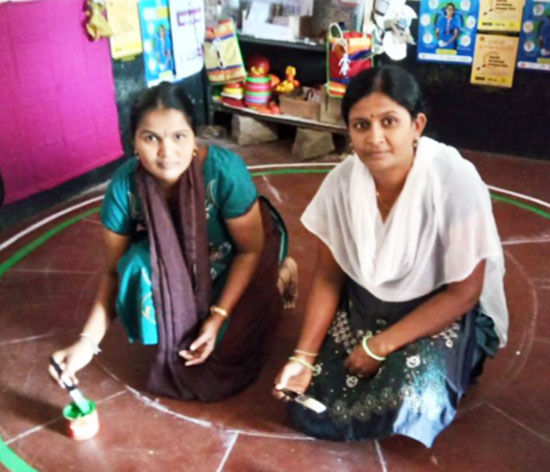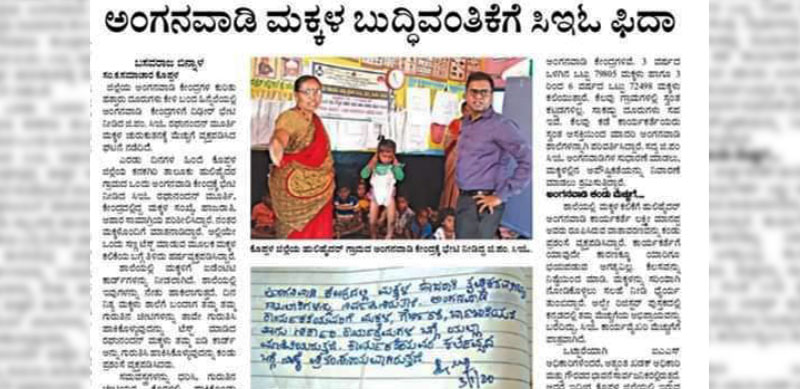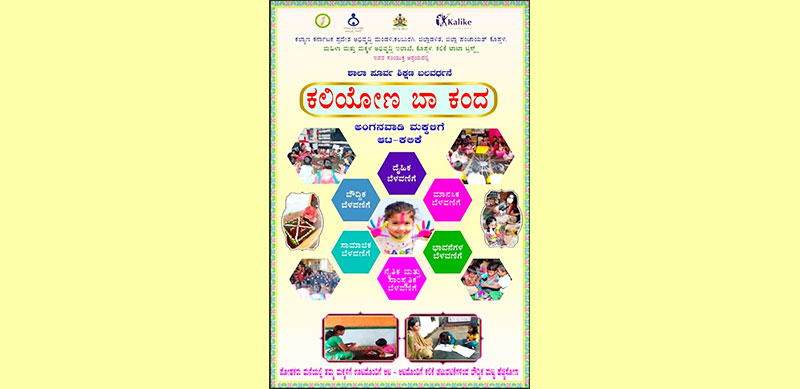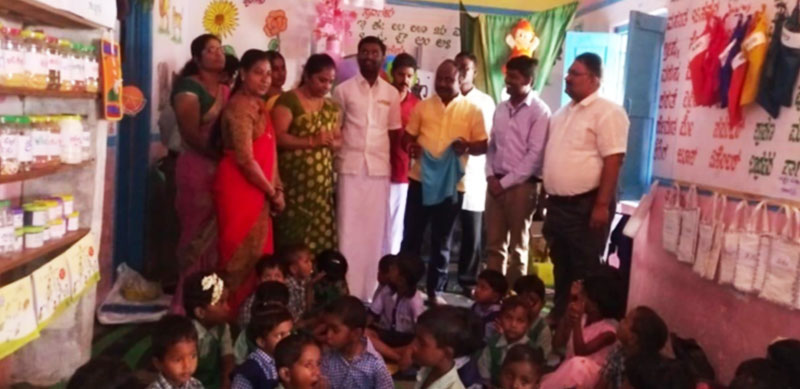
Pre-school games and activities aren’t just pastimes; they are critical for moulding young children’s minds and preparing them for primary education. Research also shows that children with exposure to pre-school education (PSE) fare better than those who don’t. But while PSE plays an important part in India’s Integrated Child Development Services (ICDS) programme, reports have found deficiencies in the quality of the PSE activities conducted at Anganwadis, or state-run preschools. The need of the hour, therefore, is to train Anganwadi workers to deliver the right play and learning interventions to pre-schoolers between 3 and 6 years of age.
In rural Karnataka, the Tata Trusts-run organisation Kalike has accepted this challenge. Launched by the Tata Trusts in 2009 in Karnataka’s underdeveloped Yadgir district, Kalike offers interventions across many areas, one of which is early childhood education or ECE. Since then, Kalike has partnered the state’s Department of Women and Child Development to build the capacities of Anganwadi Supervisors, workers (AWWs) and helpers (AWHs) in multiple districts. To date, it has trained 421 Supervisors and 12,985 AWWs across 6 districts of Kalyana Karnataka, and equipped them with much-needed ECE teaching and learning materials.
Taking the first step
In many parts of India, Anganwadi education is the first stage of a child’s early development. ECE is a set of joyful play-way daily activities visibly sustained for three hours every day. It includes things like outdoor and indoor activities, games, storytelling, singing, observation, exploration, drawing, clay modelling, etc. These activities don’t necessarily impart formal learning, but they develop the child’s attitudes, values, and behaviour patterns while providing the right environment for his/her growth. And since AWWs and AWHs are the frontline staff responsible for building this foundation, giving them training and support in the form of capacity-building workshops, learning resource materials, and feedback has become imperative.
Since its founding in 2009, Kalike has helped develop pre-primary education services across several Anganwadis in Yadgir. Around 2017, the regional commissioner of Kalaburgi, Mr Harsha Gupta visited and observed the processes implemented by the Trusts in Yadgir. Impressed, Mr Gupta expressed his interest in scaling up the ECE component to all districts of the Kalyana Karnataka region. A subsequent meeting was held with all the six deputy directors and Child Development Program officers (CDPOs) of the government’s Women and Child Department, and a plan was formulated.
Following this, Kalike conducted a baseline survey with a sample of 635 Anganwadi Centres (AWCs) in six districts of Kalyana Karnataka to understand the ground reality. It found that:
- Only 64% of the surveyed AWCs had their own premises.
- Only 44% of the AWCs were in good condition.
- The average enrolment of children aged 3-6 years for PSE was 30-37%
- Only 52% of enrolled children attended the AWC, at the time of the visit.
- The cleanliness of the PSE Learning room was maintained in only 134 (21%) AWCs. Only 8 AWCs had displayed the art works of children.
- Just 19% of AWCs had adequate playing space for children.
In addition to the above, a majority of AWCs held unorganised play and rote learning sessions. This presented the need for planned activities aimed at improving the pre-schoolers’ reading and writing readiness. The staff also had to be trained to handle different functions, from taking care of the children’s health and nutrition to involving the latter in meaningful activities.
Thus, it was concluded that in order for the AWWs to incorporate the PSE component and perform well, they needed to be adequately trained with sufficient supervision and guidance.
The right environment for growth
The Trusts then developed a Training of Trainers framework wherein key individuals would be trained and equipped with accurate ECE knowledge so that they could, in turn, train grassroots-level workers. The broad activities for the interventions included: perspective building of CDPOs, Capacity-building of Supervisors, AWWs, and AWHs; development of material and resource support; and the establishment of model Anganwadis.
Following the Trusts’ intervention, Anganwadis in the region saw various improvements. With the teaching and learning materials, AWWs and AWHs were able to deliver better pre-school education to children. They could also create better learning environments for the kids. Meanwhile, supervisors were able to effectively monitor the progress of AWWs and AWHs and provide the necessary feedback to them.
As the intervention drew on, several observational/ demonstration Anganwadi centres were developed by the supervisors and AWWs with support from Kalike, and some of them even received additional funds from the departments. Frontline workers, too, began to gain a sense of importance and awareness about ECE. The staff began to take greater ownership and responsibility, and started mobilising resources, developing teaching learning materials, and creating engaging playful environments, all on their own. Each supervisor has developed around 3-5 centres in their respective circle. These observational/demonstration AWCs are envisaged as units of learning and training, where the training inputs are implemented and later disseminated to other centres in the circle.
One such example comes from Hirevalkunta village of Yalburga block of Koppal district. Ms Bharati Talkeri, an AWW, and Ms Nagamma S Gundur, a Supervisor, organised racks for storing learning materials, developed additional resource materials for children, and improved the learning environment by earmarking particular spaces for display of children’s art work, play and more. An enthusiastic Ms Talkeri says that the environment and playful activities have piqued the interests of the children, leading to higher attendance.
“The Trusts’ PSE training and continued onsite support have helped me conduct two-and-a-half hours of PSE activities in the Anganwadi Centres. I have also approached the Gram Panchayat for providing support so that the play and learning area for children can be enhanced,” she says.
The project also demonstrated its impact during the pandemic. To help children engage at home, Koppal district initiated the Kaliyona Baa Kanda (Come child, let's learn) programme, which is based on Kalike's ECE video clips. Interestingly, the videos feature demonstrations by the Supervisors themselves.
"All this was made possible because of the training we have received. It really motivated us," says Ms Laxmi Gotur, supervisor at Kesaratti circle, Ganvati block, Koppal district. Mr Ashok, District Manager, was delighted when the Director of Karnataka's Women and Child Development Department, Ms Priyanka Mary Francis, visited the district and appreciated the development. Ms Francis even added that training of this kind should be encouraged and that the teachers could benefit from the Supervisors' participation as mentors.
The intervention’s sustainability has been enhanced by the involvement of parents and community members, who have now realised the importance of effective pre-school education. By improving the delivery of ECE services and roping in the community as a stakeholder, Kalike has significantly magnified the ICDS’s reach and impact across the region.
| Indicator | Target for the Project | Achieved till July 2021* |
|---|---|---|
| No of Districts covered | 6 | 6 |
| Number of CDPOs/ACDPOs Trained | 44 | 44 |
| Number of Supervisors trained | 382 | 421 (New Supervisors were recruited post the project roll out) |
| Number of Anganwadi Workers trained | 13,332 | 12,985 |
| Number of Anganwadi Helpers Trained | 13,332 | 12,725 |
| Number of Anganwadi centres conducting pre-school education activities | 13,332 | 11,824 |
| Student outreach pre-school | 399,960 | 368,020 |
| Demo Anganwadi centres by trained supervisors | 1,524 | 1,865 |



